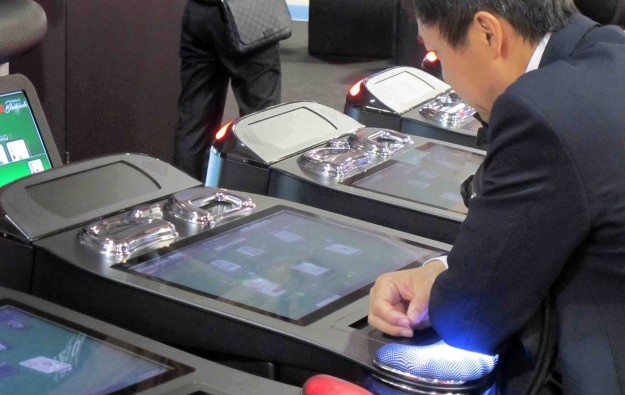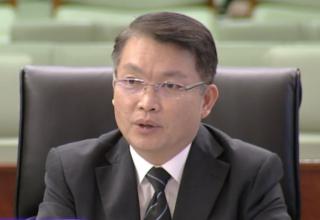Macau ETGs on rise despite lurking fears of govt cap
Jun 04, 2014 Newsdesk Features, Latest News, Macau, Top of the deck

The number of electronic table games (ETG) seats in the Macau market could grow by more than 60 percent in the next three years estimates Union Gaming Research Macau Ltd.
The research house said in its third annual review of the product segment that there are currently around 5,500 seats in Macau. It adds that could grow by at least 3,500 – or 64 percent – in the next 36 months, as new properties open on Cotai, and casino operators look to make ever more efficient use of their precious live table allocation under the Macau government’s live dealer table cap by pushing up minimum bets.
The live table cap is calculated at three percent compound annual growth until the end of 2022 from a base of 5,485 tables in the market at the end of the fourth quarter 2012.
Union Gaming stated: “…in order to accommodate lower-end mass market play, these [lower end mass market] customers are being pushed towards ETGs as the best option to play at lower stakes (e.g. under HK$500 per hand on baccarat). Large stadium-style ETG installations have become commonplace at all flagship properties, but especially at big box properties on Cotai.”
Industry sources spoken to by GGRAsia have however issued a note of caution in terms of the future growth of the ETG segment in Macau, pointing out that the Macau government is looking closely at the issue of the velocity and size of betting – even at low minimums – that is possible on such machines and on traditional slot machines, thanks to electronic betting. That’s regardless of whether the individual ETG product has a live dealer.
The issue for the government, according to the sources, is the risk of low-income people losing a large amount of money in a short space of time via ETGs and slots.
In January, Francis Tam Pak Yuen, Macau’s Secretary for Economy and Finance, told the Legislative Assembly the government was considering a cap on “slot” numbers, but went on to refer to “electronic gaming” as a genre.
“We have actually started some studies on this as the current slots are so much different from what we had in the past due to the rapid growth on the development of electronic gaming equipment,” he told assembly members.
It’s not clear however what the timetable for implementing any such cap might be.
For the time being, the Macau market in particular is enthusiastically adopting ETGs. Union Gaming suggests that what might have started out for casino operators as an expedient response to the table cap has proven itself to be a profitable business model, with relatively quick payback on the up front capital costs of the equipment.
Union Gaming’s note suggests that “win” (i.e. amount bet minus prizes paid) per seat per day for stadium-style ETGs in Macau has risen 92 percent between the first quarter of 2011 and the first quarter of 2014, while the average quarterly installed base of seats has grown by more than 400 percent, from around 650 to 3,251.
“Assuming an EBITDA [earnings before interest, taxation, depreciation and amortisation) margin of about 45 percent on gross gaming revenue generated on these games, we estimate the payback period for a casino operator is approximately seven months (based on 1Q14 win per day),” stated Union Gaming, referring to the Macau numbers.
The growth in popularity for ETGs is not confined to Macau. GGRAsia reported on Tuesday that Macau-based gaming supplier LT Game Ltd forecasts sales to overseas markets will account for 60 percent of the company’s revenue in 2015.
Union Gaming says there are already around 1,800 ETG seats in Singapore and Cambodia. The research firm thinks a further 2,000-plus seats are spread across regional markets including Malaysia, the Philippines, South Korea, and Vietnam.
Union Gaming estimates that more than 90 percent of the Asian market for ETGs is shared by six companies, which it lists in alphabetical order as: Alfastreet, a privately held Slovenian gaming equipment manufacturer; Aruze Gaming America, a privately held company owned entirely by Kazuo Okada; Bally Technologies Inc (via its SHFL entertainment subsidiary); Interblock DD of Slovenia, a 50 percent-owned subsidiary of Australia’s Aristocrat Leisure Ltd; Novomatic, under Novomatic AG Holding, a privately held Austrian gaming manufacturer, and Paradise Entertainment Ltd, listed in Hong Kong, under the LT Game brand.
Related articles
-
 IGT ‘Wheel of Fortune’ theme now in...
IGT ‘Wheel of Fortune’ theme now in...Sep 26, 2024
-
 Massive Gaming, LT Game sign slot...
Massive Gaming, LT Game sign slot...Sep 25, 2024
More news
-
 GKL provides its new table game...
GKL provides its new table game...Nov 22, 2024
-
 The Baron Upright, a new cabinet from...
The Baron Upright, a new cabinet from...Nov 22, 2024
Latest News
Nov 22, 2024
Casino operator Grand Korea Leisure Co Ltd (GKL) says it has achieved its first commercialisation of a new-to-market table game, developed via an in-house competition dating to 2021. Grand Korea...Sign up to our FREE Newsletter
 (Click here for more)
(Click here for more)
Pick of the Day
”As we navigate the final steps of the licensing process, we remain confident in our ability to align with Brazil’s regulatory requirements”
Eusebio Tanco
Chairman of DigiPlus Interactive
Most Popular
 Macau to get 36mln visitors in 2025: Secretary Lei November 21, 2024
Macau to get 36mln visitors in 2025: Secretary Lei November 21, 2024  Gaming technology firm IGT reports hacking incident November 21, 2024
Gaming technology firm IGT reports hacking incident November 21, 2024  Wynn Al Marjan building structure 55pct complete: promoter November 22, 2024
Wynn Al Marjan building structure 55pct complete: promoter November 22, 2024  EBITDA a focus in Macau market share battle: Jefferies November 21, 2024
EBITDA a focus in Macau market share battle: Jefferies November 21, 2024  Star Entertainment clinches US$130mln loan facility November 21, 2024
Star Entertainment clinches US$130mln loan facility November 21, 2024









